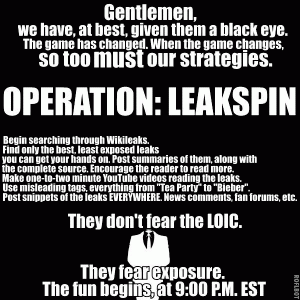The full weight of the U.S. government is being brought down upon Wikileaks, and mainstream media outlets have predictably been repeating the misinformation campaigns of those in power.
Here are the top 5 myths and lies we’re being told:
“Wikileaks is recklessly publishing documents without thinking of the consequences.”
This is a flat-out lie. Wikileaks displays quite clearly on its website that only about 1,000 of the 250,000 diplomatic cables in its possession have been released. Nearly all of those 1,000 documents were first released to mainstream news organizations, and Wikileaks published the ones the news outlets requested. On top of that, the documents were redacted as journalists deemed appropriate. If you want to blame Wikileaks for “recklessly” releasing government secrets, blame the news organizations for “recklessly” deeming them newsworthy.
“Wikileaks is a criminal organization.”
Wikileaks has not been charged with any crime. Not one. There has been tough talk from politicians calling Wikileaks a terrorist organization, and urging prosecution under the Espionage Act, but it has been only talk. In fact, a report by the Congressional Research Service, the independent investigative arm of Congress, has said that such prosecution would legally and politically unwise.
Instead, Wikileaks is being “prosecuted” outside of the courts, outside of the law, by public relations smear campaigns.
“This is not about freedom of the press. Wikileaks is not journalism.”
In addition to publishing documents supplied by whistleblowers, the staff of Wikileaks also reviews this information, provides commentary, and facilitates the flow of this information to news organizations. Wikileaks is not a conventional, old-guard media outlet. But that doesn’t matter. It is applying the methodology and spirit of journalism to a digital age. Wikileaks is providing checks and balances on government power.
“Full transparency as envisioned by Wikileaks would jeopardize government operations and make all of us less safe.”
There are a lot of lies and half-truths built into this line of reasoning. First among them is the notion that 1) Wikileaks exists to make all government secrets public and 2) that Wikileaks CAN make all government secrets public. The fact is that the Obama administration has trumpeted “transparency” while the government has grown more secretive than ever before. Even if Wikileakers had the desire (which there has been no indication that they do), it is simple not possible to republish and analyze all of these documents. This is not about “full-transparency,” it is not about us monitoring every single thing that every single government official does. It is about the freedom of news organizations to decide which of these documents are of the public interest.
“Wikileaks is sabotaging diplomatic relations and making it harder for governments to do their jobs.”
This final theme is not so much a myth as it is a total bastardization of the purpose of journalism. Yes, news that Secretary of State Hillary Clinton authorized UN spying has probably made it harder for her to maintain positive relationships with some countries. Yes, news that U.S. contractors hired young boys to entertain Afghan police put another black mark on the image of the U.S. But you know what? It should.
Journalists should make it harder for politicians to do their jobs. This is about checks and balances on government power. Journalists who say the organization has “gone too far” are operating from a tepid notion of the craft: that journalists should speak truth to power only up until the point that truth doesn’t make people in power look too bad.
To be clear, Wikileaks is not a perfect organization. It has flaws. Plenty of them. And so do the people involved. However, it is putting forward a radical new model of journalism. And the attacks on Wikileaks have prompted a proportionate response. A group of hackers, or “hacktivists,” calling themselves “Anonymous” have launched an attack against those who threaten freedoms of the press. They started by taking down Visa, Mastercard, and PayPal. Now, as the image above indicates, they’re calling for a new, more radical tactic: journalism.
They are encouraging people to review the Wikileaks documents, find news of corruption, write about it, and inform others. Appropriately, “Anonymous” has used Orwell as its rallying cry:
“In a time of universal deceit, telling the truth becomes a revolutionary act.”
